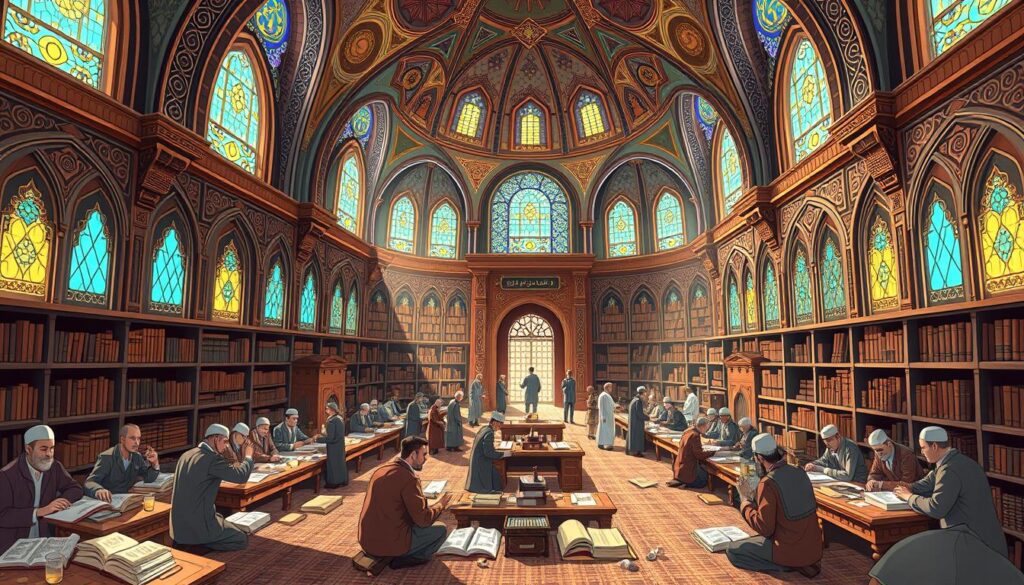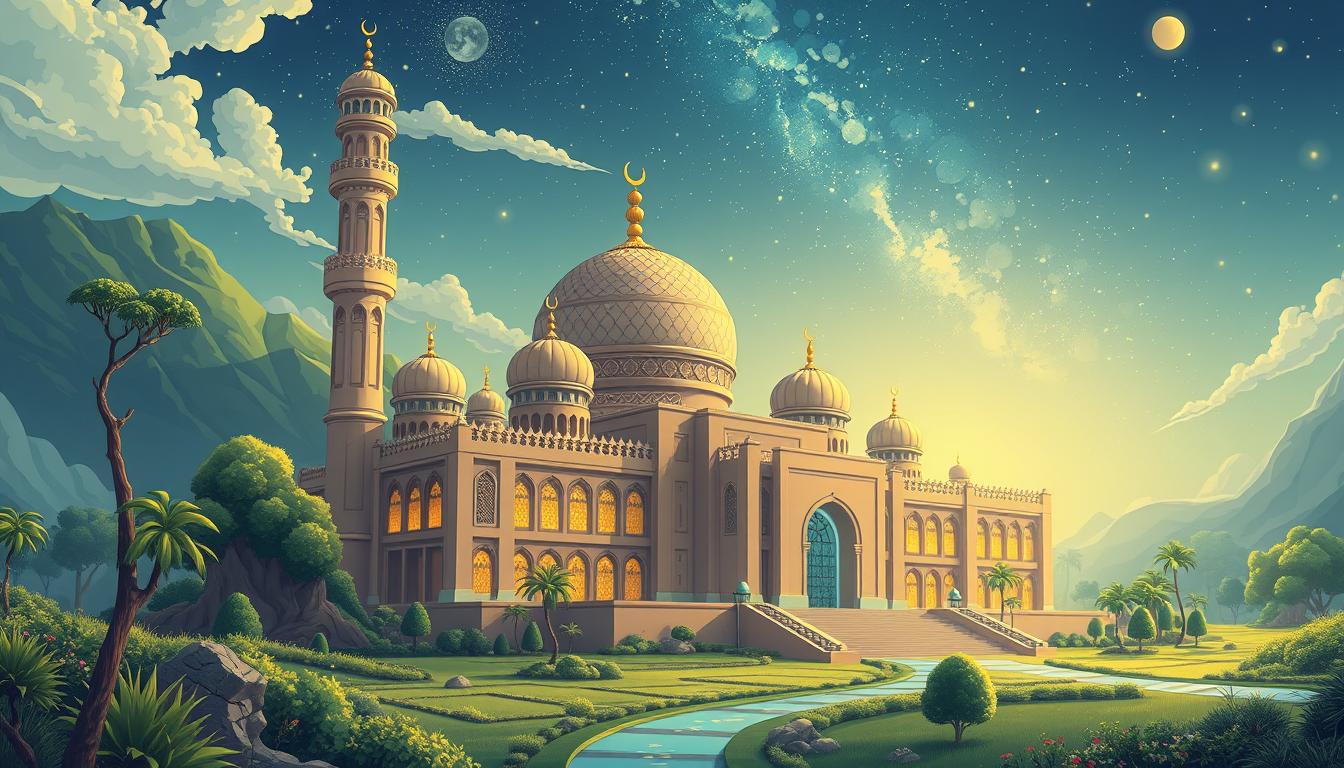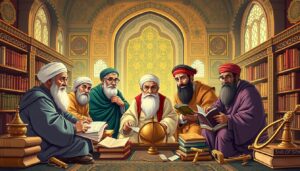In the Islamic view, there’s a deep tie between faith and knowledge. Our beliefs push us to explore and find out more. The Quran, our holy book, encourages us to look at the world around us. It tells us that learning is not just good; it’s our duty.
Bruno Guiderdoni, a top astrophysicist, talks about how Islam leads us to seek knowledge. The Quran mentions the natural world about 750 times. This shows how our faith fits well with science. It’s a tradition that combines Islamic thoughts and scientific studies.
We see ourselves as “garden keepers” of our planet, amid issues like climate change. It’s our job to take care of the earth in a moral way. By doing this, we get to know Allah’s creation better.
Key Takeaways
- The Quran encourages the pursuit of knowledge as a significant aspect of faith.
- Islamic teachings present a supportive framework for scientific inquiry.
- Historical scholars laid the groundwork for modern disciplines through their research.
- Ethical considerations in science align with Islamic values and responsibilities.
- Both theoretical and empirical explorations are essential for understanding the cosmos.
Understanding the Foundations of Islamic Science
The study of Islamic science starts with the Quran’s teachings. It tells believers to think about creation and seek knowledge. Faith and learning go hand in hand, making room for exploring the natural world. This has led to big discoveries in history thanks to famous Muslim scholars.
The Role of the Quran in Scientific Thought
The Quran inspires Muslims to learn and ask questions. It says, “My Lord, increase my knowledge.” It connects worship with gaining wisdom, where fasting and prayer ready the spirit for divine truths.
The Prophet of Islam reportedly stated that the excellence of a learned man over a mere worshipper is “as the excellence of the full moon over the stars.”
Islamic knowledge goes beyond just facts. It looks at both the material and spiritual worlds. Scholars like Ibn Sina show that real science ties back to a divine source. This approach adds moral depth to scientific work, linking it to higher truths.
Historical Contributions of Muslim Scholars
Muslim scholars have greatly contributed to many areas, inspired by the Quran. During the Islamic Golden Age, people like Al-Khwarizmi and Ibn Sina advanced math, medicine, and philosophy. Their work mixes the study of nature with a spiritual journey.
| Scholar | Field | Key Contribution |
|---|---|---|
| Al-Khwarizmi | Mathematics | Introduced algebra, establishing the foundation for modern mathematics. |
| Ibn Sina | Medicine | Pioneered medical texts, influencing future generations and practices. |
| Al-Biruni | Astronomy | Created methods for determining latitude and longitude, advancing navigational sciences. |
The work of Muslim scholars shows the deep link between the Quran and science. Their legacy continues to lead others in the search for knowledge and wisdom.
The Compatibility of Faith and Rational Inquiry
The relationship between faith and reason is a lively topic within Islamic thought. This dialog stresses the value of Tawhid. Tawhid is about believing in the oneness of Allah, vital for understanding the universe. Seeing scientific exploration as a chance to find divine order helps to link faith with logical study. This approach makes such a connection fulfilling.
The Concept of Tawhid in Science
Tawhid guides us to blend our beliefs with the quest for knowledge. This bond leads to a unified view where nature’s laws show the Creator’s wisdom. Looking into science with this mindset, we see how faith and reason can mesh. This fusion offers a deeper insight into our surroundings. Islamic science works to uncover God’s design, pushing scholars and the faithful to see creation’s wonder through facts.
Exploring Ijtihad and Scientific Exploration
Ijtihad encourages thinking for oneself, pushing for innovation in science and a zest for learning. This idea boosts original scientific thinking and a lively curiosity. It lets us marry religious teachings with real-world findings. Thus, expanding our grasp of science. Embracing Ijtihad links faith with today’s discoveries, fostering growth while staying true to spiritual roots.

Notable Islamic Scholars and Their Discoveries
Throughout history, notable Islamic scholars have given much to the world of science. Their discoveries show a deep grasp of the universe through Islamic views. These scholars worked across different areas, creating a legacy that still affects our thinking today.
Al-Khwarizmi: Father of Algebra
Known as the father of algebra, Al-Khwarizmi changed math forever. He brought the decimal system to the West and found ways to solve equations. His book, “Al-Kitab al-Mukhtasar fi Hisab al-Jabr wal-Muqabala,” made algebra its own branch of math. Besides math, he helped map the Earth’s measurements under Caliph al-Mamun.
Ibn Sina: Influences on Medicine
Ibn Sina, or Avicenna, made a big splash in medicine. His “Canon of Medicine” was a must-read in Europe for ages. He tackled diseases and treatments, making medicine more systematic. Ibn Sina also delved into the relationship between the mind and body, which shapes how we see mental health today.
Al-Biruni: Pioneering Geography and Astronomy
Al-Biruni stood out in geography and astronomy for his precise work. He figured out the Earth’s radius and enhanced our knowledge of materials’ specific gravities. By cataloging stars and insisting on direct observation, he laid groundwork for future discoveries. Al-Biruni’s work shows that seeking knowledge about the world honors Islamic traditions.
| Scholar | Primary Contributions | Field |
|---|---|---|
| Al-Khwarizmi | Introduction of algebra, decimal system, geographic calculations | Mathematics |
| Ibn Sina | Canon of Medicine, studies in psychology | Medicine |
| Al-Biruni | Measurements of the Earth, studies in astronomy | Geography and Astronomy |
The Importance of Empirical Observation in Islam
Observing the world plays a key part in Islam’s quest for knowledge. This journey lets us see the connection between the Hadith and modern science. Early Muslim scholars used their faith to guide their scientific studies. Their work made a big impact across many areas.
The Hadith and Scientific Methodology
The Hadith, which includes the Prophet Muhammad’s words and deeds, is crucial for Muslims. It often talks about learning through watching and asking questions. Here are some key ideas:
- Learning is important all through life.
- Thinking about nature helps us appreciate the Creator’s work.
- There’s a strong link between Islam and finding answers to questions.

Case Studies in Islamic Empiricism
History shows how Islamic scholars used observation for scientific discovery. For example, Ibn al-Haytham, known as the “father of optics,” studied light and vision closely. Al-Khwarizmi used observation and algebra to solve real-world problems. This includes money matters in inheritance.
| Scholar | Contributions | Field of Study |
|---|---|---|
| Ibn al-Haytham | Developed theories of light and vision through observation | Optics |
| Al-Khwarizmi | Introduced algebra as a solution for mathematical problems | Mathematics |
| Ibn al-Nafis | Discovered pulmonary circulation based on anatomical studies | Medicine |
These stories show the tight bond between Islam, observation, and science. They highlight how faith and thinking have driven the search for knowledge. They prove observation and logic are key to our understanding of the world even today.
The Relationship Between Religion and Scientific Principles
The relationship between religion and science is both complex and ongoing. It involves understanding how faith and technology interact. Ethical implications in science are important conversations, especially with new tech advancements. It’s crucial to make sure these advances respect religious beliefs, especially in Islam.
Ethical Implications of Scientific Advancements
Innovation in areas like biotechnology and AI brings up ethical questions. These are important for our morals. Islam gives us special views on these, promoting respectful technology use. Topics like gene editing and cloning are sensitive, with faith shaping our views.
Balancing Faith with Technological Development
To balance faith and tech, constant talks between scholars, scientists, and religious figures are needed. This helps us see how religion and scientific principles can work together. These conversations aim for technological progress that benefits us all, while sticking to Islamic teachings.
| Area of Concern | Religious Perspective | Scientific Consideration |
|---|---|---|
| Gene Editing | Ethical concerns regarding human dignity | Potential to cure genetic diseases |
| Cloning | Debates on the sanctity of life | Impacts on biodiversity and reproduction |
| Artificial Intelligence | Fears of dehumanization | Enhancements in daily life and work efficiency |
Each of us has a role in linking faith and technology. We aim for progress that upholds the common good and our religious values.
Education and Scientific Pursuits in Islamic History
Throughout Islamic history, education has been key in pushing science forward. Islamic schools, especially madrasas, were crucial for spreading knowledge. These madrasas were not just important; they changed the game by mixing religious and scientific learning.
The Role of Madrasas in Advancing Knowledge
Madrasas were at the heart of intellectual growth. They were the main support for education in Islamic history because:
- Offering diverse subject matter, from theology to mathematics.
- Encouraging critical thinking and scientific inquiry among students.
- Serving as a space for dialogue and discussion on various sciences.
Notable Islamic Universities and Their Contributions
Islamic universities have given a lot to the world’s knowledge pool. Places like Al-Azhar were key in holding onto old knowledge while also bringing in new ideas in all sorts of areas. They have done things like:
- Enlightening generations with profound insights from various disciplines.
- Facilitating interactions with scholars from different cultures through multicultural collaboration.
- Continuing to evolve with modern educational practices, including online courses in Islamic teachings.

The Influence of Islamic Science on Western Thought
The sharing of knowledge from Islamic to Western civilization was a key moment in science history. The translation movement was central in connecting both worlds. It brought Islamic knowledge to European thinkers, setting the stage for future breakthroughs.
The Translation Movement: A Bridge to the West
In the late 11th century, around 1070, significant efforts began to change Western thought. In cities like Toledo, Arabic scientific works were translated into Latin. This was crucial for scholars who wanted to discover new ideas.
- Translators like Gerard of Cremona and Dominicus Gundisalvi played a big role, making medical and natural philosophy texts available.
- By 1255, Aristotle’s works became mandatory in the Paris arts faculty, showing the translations’ academic value.
- A total of 131 Arabic philosophical works were translated, highlighting their impact on Western thought.
The Scientific Revolution: Islamic Roots
The roots of the scientific revolution can be traced back to Muslim scholars. Their work was foundational for progress in fields like math and astronomy.
| Islamic Scholar | Contribution | Impact on Western Science |
|---|---|---|
| Al-Khwarizmi | Basic texts in Algebra | The word “Algebra” comes from Arabic “al-Jabr,” crucial in Western math. |
| Ibn al-Haytham | Detailed studies on optics | He influenced European thinkers like Roger Bacon. |
| Avicenna | Important medical writings | His work was a key medical reference for over 500 years. |
The interaction between the translation movement and Islamic influence paved a new road for thinking. This bond shows how early Islamic work helped drive the Renaissance and shapes our science today.
Islam’s Stance on Environmental Science
The Islamic view highlights a deep bond between faith and caring for our planet. It teaches us to be guardians of nature, inspired by the Quran. These teachings offer wisdom and practical advice for today’s environmental issues.
Quranic Teachings on Nature Conservation
Islam sees looking after the environment as a duty of faith. The Qur’an tells us that nature, like earth, water, and light, is essential for life. They should be respected and protected. Prophet Muhammad (saw) taught us to use things wisely, avoiding waste.
- The Qur’an encourages clean and pure natural resources, mentioning “purify” often.
- Humans are Earth’s caretakers (khalifa), tasked with preventing harm (fasad) to nature.
- Islamic teachings support the United Nations’ goals for responsible consumption and fighting poverty.
Modern Environmental Challenges and Islamic Solutions
Issues like pollution and the loss of wildlife need quick action. Islamic teachings offer guidance through concepts like Tawhid (unity), Fitra (creation), Mizan (balance), and Khalifa (responsibility). The Quran advises against harming the earth and promotes caring for it.
| Islamic Principle | Description | Relation to Modern Challenges |
|---|---|---|
| Tawhid | Unity of all creation, emphasizing interdependence. | Promotes holistic environmental stewardship. |
| Fitra | Natural state of creation, encouraging respect for nature. | Encourages practices that protect ecosystems. |
| Mizan | Balance in all things, advocating for moderation. | Guides responsible resource use and waste reduction. |
| Khalifa | Humans as guardians of the Earth, with a duty to preserve. | Imposes accountability for environmental degradation. |
Caring for the environment is a must in Islam, woven into its ethics. These Quranic teachings drive us to face environmental challenges together, with purpose.

Current Developments in Islamic Science
Exploring current Islamic scientific developments shows how much faith shapes innovation. In biotechnology, Islamic ethics are critical. These ethics make sure science follows moral and religious values, leading to responsible research.
Biotechnology and Its Ethical Considerations
Islamic principles are key in biotech science, influencing research methods. Islamic scientists contribute to advancements, always following ethical rules. These rules, based on teachings, ensure respect for human dignity in genetics and cloning research. Such work matches the Islamic call to gain knowledge responsibly.
Islamic Contributions to Space Exploration
Muslim scientists are making big strides in space exploration. Their work showcases a dedication to understanding the cosmos as part of God’s creation. Islamic nations work with global agencies, aiming to solve major space mysteries. This reflects deep curiosity about our universe and our place in it.
This mix of faith and science in Islamic discoveries shows Islam’s ongoing influence on ethical science and space. This balance benefits both science and the Muslim community, creating an innovative and ethical environment. Resources like this curriculum resource highlight this impact in education.
Science and Spirituality in Contemporary Islam
In modern Islam, science and spirituality beautifully mingle. They create a space where each supports the other. Scientific breakthroughs can deepen our spiritual understanding, making us appreciate Allah’s creation more.
The Intersection of Faith and Scientific Inquiry
The Quran talks a lot about the importance of ‘Ilm, or knowledge. This shows a deep care for science and its link to faith. Verses encourage us to think and observe, forming a bridge between faith and science.
This idea fits with Amin Abdullah’s concept of blending Islamic spirituality with scientific research. It shows that both can work together in harmony.
Spiritual Insights from Scientific Discoveries
Scientific progress opens new paths to spiritual enlightenment. It shows our dedication to improving ourselves and our surroundings. Faith-driven scientists bring out discoveries that enrich our spiritual life.
Islam’s view on science and spirituality helps us see the world’s wonders in a deeper way. It strengthens our faith in Allah and the value of science.

Future Directions for Islamic Science
Looking ahead, the growth of Islamic science rests on our ability to bring up a new generation of Muslim scientists. By pushing for young people to dive into science, we give them the tools to connect with worldwide ideas. They can tackle key issues like food, shelter, and clean energy.
This process helps build lasting scientific methods that aren’t tied to outside money. It makes sure our work reflects the deeper values of humanity.
Fostering a New Generation of Muslim Scientists
It’s critical to improve education and focus on the sciences. Many Muslim countries fall behind in literacy and education achievements, showing a real need for change. By aiming for inclusive and ethical science, we can change Islamic science for the better.
This means promoting values in our scientific work. The movement to blend Islamic teachings with modern science aims to do just that.
Interfaith Dialogues on Science and Religion
Additionally, talking about science and religion with other faiths is very valuable. These discussions help us understand each other better. They show how different beliefs can come together to push science forward and think deeply about technology.
As we move forward, it’s key to keep human wellbeing and ethics at the center of our science. Doing this ensures a hopeful future for everyone.






